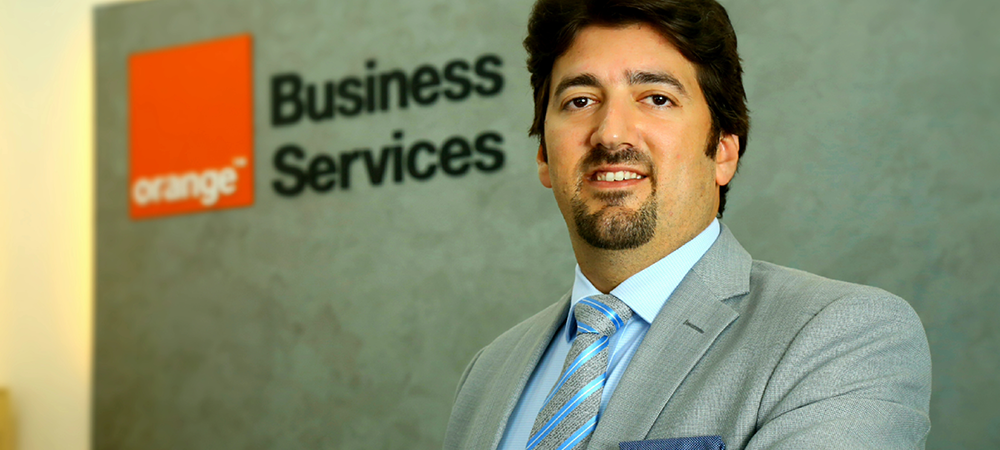On the lighter side of things, we ask the industry experts what makes them tick. Here we speak to Sahem Azzam, Vice President Middle East and Africa, Orange Business Services
What would you describe as your most memorable achievement?
From a career perspective, being promoted to lead a services business unit in the Middle East and being specifically asked to turn it around and grow the business was certainly one of the major professional challenges I have faced so far. It took me 18 months to achieve it and I learned a lot – that success is fuelled by many factors: having the right strategy, focus, the right combination of talent, calibre of people and the right leadership in place. We had successful sustained growth for four years before I moved to another role.
What first made you think of a career in technology?
Initially, I wanted to go to medical school because of my father’s influence and I followed this path until high school but then opted for communication engineering. I realised the impact of continually evolving technology and it’s future potential, so I started to do Microsoft and Cisco training courses to develop my knowledge and understanding and to be ready for the market place with the right skills. I did the training while I was studying at university and it gave my career a boost. I focused on emerging technologies such as VOIP and contact centres, and I enjoyed combining learning and working at the same time and this made my job more fun.
What style of management philosophy do you employ with your current position?
I have always combined consultative and directive management styles; I use consultative more often to listen to the team and gather different opinions to select the best option when considering an important decision, for example. In addition to creating consensus among the team, it’s an effective way to engage the team and to get them actively involved in making decisions. However, when there is little or no time for consultation or a clear consensus, I opt for a more directive style because ultimately, someone has to ‘call the shots’ when we have to act faster. So far, this combination – with an emphasis on the consultative approach – has proven to be very successful and helps develop mutual respect between team members and leaders.
What do you think is the current hot technology talking point?
Artificial Intelligence (AI) is one of the most exciting current hot topics with so many pilot phases underway; we have already started to see different applications such as chatbots, city concierges, government services. The use cases for these technologies are very broad, and it’s evolving so quickly. I believe the demand for AI skills and use cases will increase as applications widen and the impact of AI deepens. Adoption levels will vary from country to country and from sector to sector but all will have some level of AI implemented over the next two to three years.
How do you deal with stress and unwind outside the office?
I am a very social person and enjoy spending time with family and friends. I usually spend Fridays relaxing with my family and then more active Saturdays – starting the day with biking or other sports then going out for a family lunch and then the evening with friends. Every year, I do a hiking trip around the world with a group of friends as a kind of disconnect from daily life and to re-connect with nature and simplicity.
If you could go back and change one career decision what would it be?
Looking back, I can say that there is nothing I would change in my career journey so far – I have learned something valuable about the workplace, people or myself from every role and experience.
What do you currently identify as the major areas of investment in your industry?
Smart Cities and smart districts are developing fast and we see this as a big trend in the region with many organisations looking to offer smart services. The expectations of citizens and governments are rising and demand is growing. Today, citizens expect a simpler, easier and more convenient way to request services and to get them via their mobile apps, regardless of the location of the service provider. At the same time, governments are looking to provide better services and ensure happy citizens, while managing costs, and so to automate services wherever possible,
What are the region-specific challenges when implementing new technologies in the Middle East?
Adaptation of new technologies and trust are usually the two main challenges to implementation in the region. Most organisations will not roll out new technologies that are not tested or in large-scale production; this is especially the case with software products where customers expect a lot of fixes to follow an initial release based on customer feedback and experience. On the other hand, there is relatively little awareness about the broader impact of adopting new technology and the need for change management to get the real benefits of the technology. Learning about new technology and the way it changes how people do things is always part of the challenge in the region.
What changes to your job role have you seen in the last year and how do you see these developing in the next 12 months?
I have just started my new role with Orange Business Services and so ask me again in 12 months and I would be happy to answer.
What advice would you offer somebody aspiring to obtain C-level position in your industry?
I would say there are three areas to look at – firstly, acquiring the right level of knowledge about the industry; building a good executive network to help with quick wins and provide support when needed; and finally the right leadership attitude towards people, customers, business and culture.
Click below to share this article

